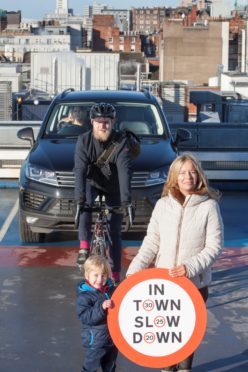The Scottish Government is urging people to slow down when driving through town centres after new figures have shown this is where the large majority of accidents occur.
Research has shown 34% of people in Scotland will rush through town if running late for work and 58% will take risks when travelling in built-up areas.
One in 20 said they drive on autopilot every day and don’t pay full attention to their surroundings.
As well as this, the findings show 96% of accidents involving pedestrians happen in built up areas.
Following this the Scottish Government has launched a new campaign with a message for all road users: In Town, Slow Down.
The initiative has been backed by numerous other organisations including Living Streets Scotland, Cycling Scotland and a number of local authorities.
MSP Humza Yousaf, who serves as minister for Transport and the Islands, urged people not to “risk it.”
He said: “We are committed to achieving safer road travel in Scotland for everyone and it’s important drivers and riders travel at an appropriate speed for the environment and the conditions, especially in built-up areas where there are many vulnerable road users.
“Whether we drive, ride, cycle or walk, we all share the same road and our actions can have serious consequences. So don’t risk it.”
The majority of accidents take place between 4-6pm on weekdays and 1-3pm at weekends.
Keith Irving, chief executive of Cycling Scotland, also backed the campaign.
He said: “Cycling is on the up in our cities and towns and we need to reverse the increase in serious injuries amongst people cycling.
“Engineering, enforcement and education are all essential to make roads safer for everyone, whether we are cycling, driving or walking.
“Today’s campaign is one of the many initiatives we need to deliver to achieve this.”
